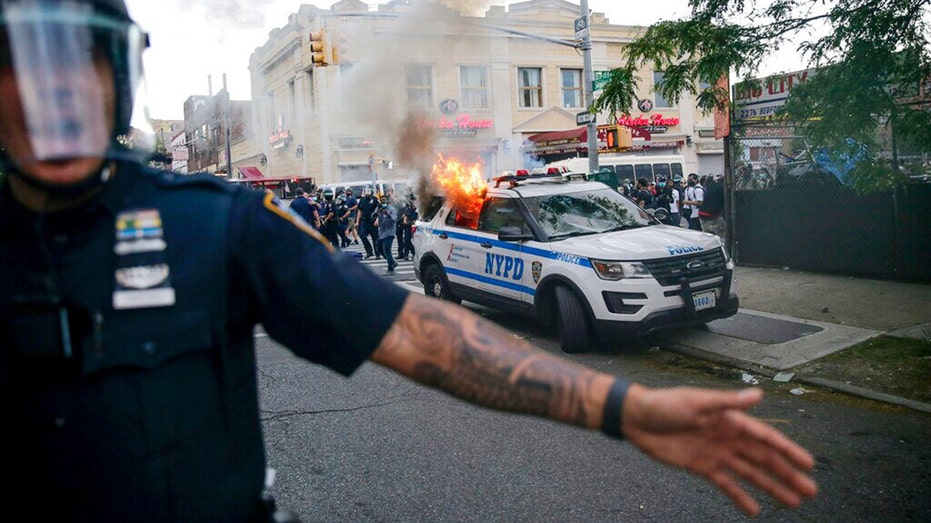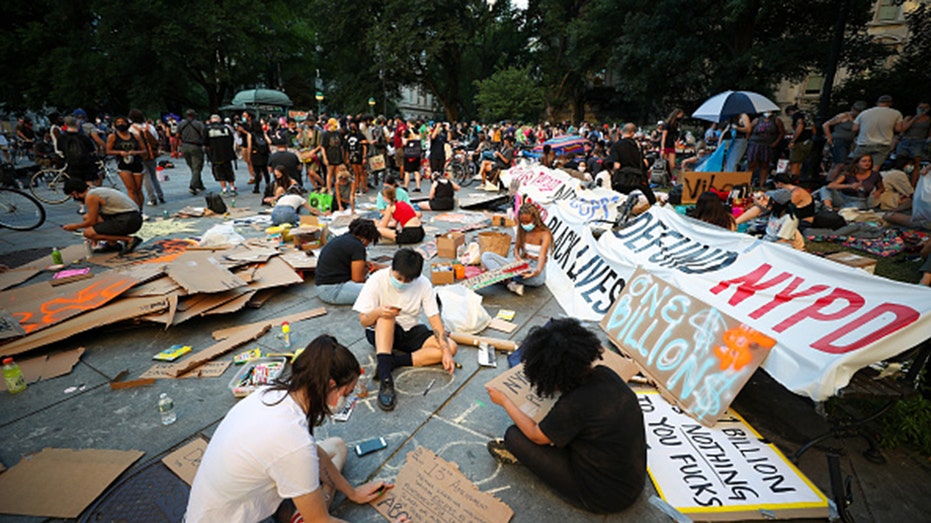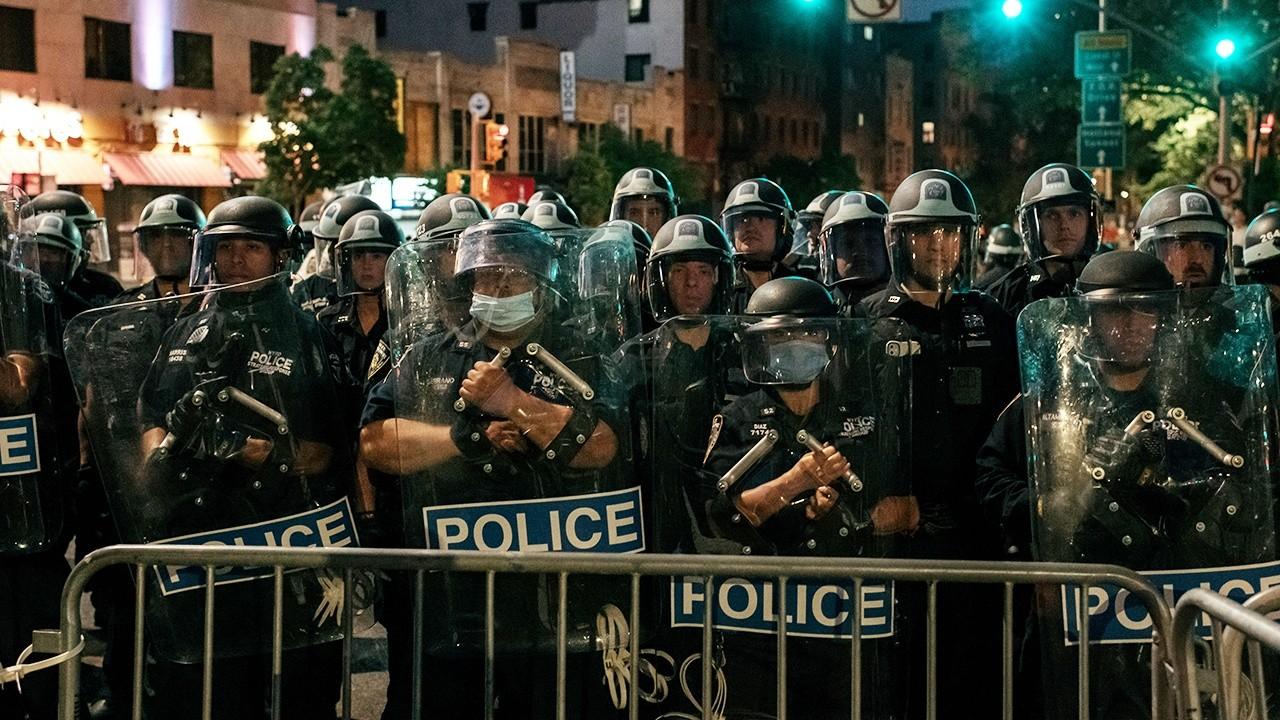NYPD retirements on the rise: 'It's a no-brainer'
NYPD cops leaving after policy changes, budget cuts
The New York Police Department is fighting a surge in shootings in the wake of the outbreak of the novel coronavirus and anti-police protests that were followed by policy changes and budget cuts. And some members of the department – the largest police force in the country – have said they’ve had enough.
John Timpanaro, an NYPD detective who joined the force, retired from his post with the Cold Case Homicide Unit on June 30 – just one day after his 25-year anniversary. When he started in the South Bronx in 1995, he said, the city “was in bad shape.”
NYPD COMMANDER LEAVES BRONX PRECINCT FOR LAST TIME AFTER RETIRING IN PROTEST
“I got to watch it come back to being in really great shape,” he told FOX Business by phone on Tuesday. “And I think that on the day that I left, it's now in worse shape than when I started. And it's just a shame seeing all of that tremendous work get flushed down the toilet because of politics.”
“This can't possibly get better. It's going to get worse.”
From June 29 to July 6 of this year, 179 uniformed NYPD cops submitted their retirement paperwork, up 411 percent from the 35 who did so during the same period last year. As of Tuesday, the department had not yet released more recent numbers.
Twenty-five years on the job is what Timpanaro said was described as “a sweet spot” because members who serve at least for that long receive a raise in the form of “longevity pay.”
“Because of the climate now, the decision was there wasn't a decision to be made,” he continued. “It's a no brainer.”
He submitted his paperwork to begin the process for retirement at the very end of May, giving the department 30-days’ notice. He had previously considered staying on for another five years, but his uncertainty was short-lived.
“Once I started seeing the climate, seeing the direction that the department's going, once I started to see them entertain the whole idea of defunding the police and that they were going to take a billion dollars away from the department, I saw the writing on the wall,” Timpanaro said. “I said this, this can't possibly get better. It's going to get worse.”
Timpanaro, a 47-year-old Long Island man, spoke highly of his time with the department and of the people with whom he worked. Growing up with a father who worked as a firefighter, he knew he, too, was destined for public service, he said.
NYPD LIMITS RETIREMENT APPLICATIONS AMID 400 PERCENT SURGE THIS WEEK
"There's a lot of really honest, great men and women in uniform that do great things every day. And unfortunately, that whole perspective seems to be getting washed down the toilet because of a few bad seeds. Because of some guy in Minneapolis that was a criminal, should have never been in the police uniform to begin with," he continued. "Eight hundred thousand really good men and women that serve every day are suffering. And that's just unfair."

New York Police officers push back protesters as a police car burns during a demonstration, Saturday, May 30, 2020, in the Brooklyn borough of New York. (Seth Wenig/AP)
Since May 25, the date George Floyd was killed in Minneapolis, 306 members of the NYPD retired, 503 filed their retirement paperwork and 40 resigned, compared to the 254 retirements, 287 retirement filings and 49 resignations reported at the same time in 2019, according to department data.
“The NYPD has seen a surge in the number of officers filing for retirement,” an NYPD spokesperson said in an emailed statement. “While the decision to retire is a personal one and can be attributed to a range of factors, it is a troubling trend that we are closely monitoring.”
NYPD BUDGET CUTS AN 'ACCOUNTING GIMMICK': FORMER COMMISSIONER
Floyd, a 46-year-old Black man, died after a white Minneapolis police officer, Derek Chauvin, kneeled on his neck for several minutes, even as Floyd said he could not breathe.
New York City, in turn, experienced weeks of protests over police brutality and systematic racism that, at times, turned violent and led to accusations of police misconduct.
As the demonstrations grew, so did calls for change to police policy and budget.
The city recently approved a budget that will move $1 billion from the NYPD’s $5.7 billion policing budget to other areas, such as social services and education.
Another big change that some NYPD members, including police brass, have taken issue with is legislation dubbed the “diaphragm law,” which would ban police officers from "sitting, kneeling, or standing on the chest or back" of a subject, according to the bill.
“Anyone who has ever arrested anybody who has fought and struggled knows that there is a good chance that your knee may end up on someone’s back,” NYPD Chief of Department Terence Monahan said at a press conference earlier this month, according to NY1. “It’s a big issue to our cops.”
The “diaphragm law” is tentatively scheduled to be signed by Mayor Bill de Blasio on Wednesday, according to a Lieutenants Benevolent Association union-wide memo sent Tuesday.

A group of Black Lives Matter protestors prepare banners at City Hall across from One Police Plaza as part of the "Defund NYPD" and "Occupy City Hall" on June 24, 2020 in New York City, United States. (Tayfun Coskun/Anadolu Agency via Getty Images)
“It's almost impossible to engage in policing anymore,” Timpanaro said. “The suspect could be kicking you, punching you, assaulting you, and you got to go and try to put handcuffs on him or her and you can't hold them down. You got to be a magician to figure that one out.”
A lieutenant with more than 20 years on the job told FOX Business he had planned to stay until he had served for at least 25 years, but the police legislation was one of the main points that led him to change his mind.
“The original plan was 25,” he said, speaking on the condition of anonymity because he is still employed by the department. “Now with the strong anti-police legislation, it’s not worth losing my pension or my freedom.”
The lieutenant, who has spent his career working between the Bronx and in the headquarters at One Police Plaza, has already submitted his paperwork notifying the NYPD of his plans to retire in February.
GET FOX BUSINESS ON THE GO BY CLICKING HERE
“It comes down to the perps are not being prosecuted, but they're finding time to prosecute the cops, and it's really scary. There is no good faith anymore. Even if I want to do the right thing and I do the right thing,” he said, “I could still get locked up, put in jail and lose my pension.”
The lieutenant left a high-paying job more than two decades ago for the NYPD and started as a rookie cop working in the Bronx.
“It's always been a tough job working for the NYPD, for the police department ... But I always felt if I did the right thing, if I truly believed I was doing the right thing, that the city would support me. I'd be indemnified," he said. “It's not like that anymore. Now, my heart could be in the right place. I could be doing the right thing, what I believe is the right thing, and I still get prosecuted for it and lose everything.”
The Associated Press contributed to this report.




















